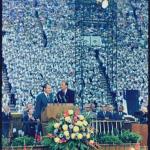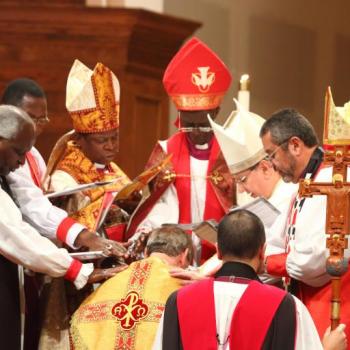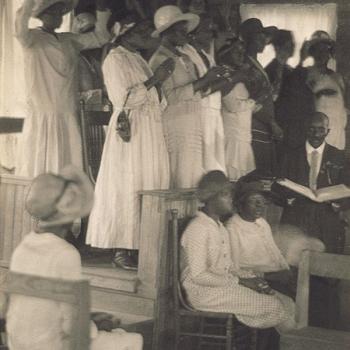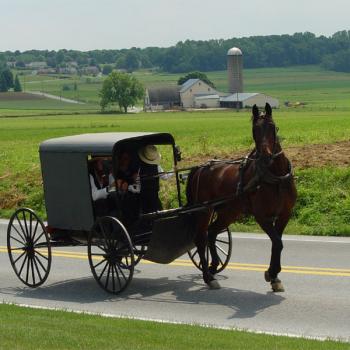Trigger warning: the following comes from a deeply committed Reformed Protestant for whom the church calendar consists of fifty-two Easter Sundays every year.
English Christmas carols do make up for the clutter, acquisitiveness, and calories that come with the December holiday, but they also have their problems. One has to do with winter. In Palestine, winter temperatures are closer to the cycles of California beaches then they are to London or Canterbury’s weather patterns. For instance, today’s high in Bethlehem is supposed to be near 60 (compared to 45 in Canterbury) and the low tonight is supposed to go down to 45 (compared to 39 in Canterbury). That’s not a huge difference, England being an island and all where the surrounding sea moderates the shortness of days. But how do you ever come up with “bleak mid-winter” when you think about weather in Bethlehem in late December (assuming that Jesus was actually born then):
In the bleak mid-winter
Frosty wind made moan;
Earth stood hard as iron,
Water like a stone;
Snow had fallen, snow on snow,
Snow on snow,
In the bleak mid-winter
Long ago.
(Christine Rossetti)
Then there’s the problem of the sentimentalization of the sweet little baby boy named Jesus which one of the great carols, “Once in Royal David’s City” unfortunately traffics in:
4. For he is our childhood’s pattern;
Day by day, like us He grew;
He was little, weak and helpless,
Tears and smiles like us He knew;
And He feeleth for our sadness,
And He shareth in our gladness.5. And our eyes at last shall see Him,
Through His own redeeming love;
For that Child so dear and gentle
Is our Lord in heaven above,
And He leads His children on
To the place where He is gone.
What could possibly be threatening about a babe like that? Well, Herod for starters knew that Jesus was not simply coming as the embodiment of good behavior for all kids. Jesus came as a king to rival Herod, in ways comparable to the threat that David, from the tribe of Judah, was a threat to King Saul, from the tribe of Benjamin. That’s why Herod ordered the execution of babies when he heard about the birth of Jesus:
1 After Jesus was born in Bethlehem in Judea, in the time of King Herod, wise men from the East came to Jerusalem 2 saying, “Where is the one who is born king of the Jews? For we saw his star when it rose and have come to worship him.” 3 When King Herod heard this he was alarmed, and all Jerusalem with him. 4 After assembling all the chief priests and experts in the law, he asked them where the Christ was to be born. 5 “In Bethlehem of Judea,” they said, “for it is written this way by the prophet: 6 ‘And you, Bethlehem, in the land of Judah,are in no way least among the rulers of Judah,for out of you will come a ruler who will shepherd my people Israel.’” 7 Then Herod privately summoned the wise men and determined from them when the star had appeared. 8 He sent them to Bethlehem and said, “Go and look carefully for the child. When you find him, inform me so that I can go and worship him as well.”. . .
16 When Herod saw that he had been tricked by the wise men, he became enraged. He sent men to kill all the children in Bethlehem and throughout the surrounding region from the age of two and under, according to the time he had learned from the wise men. 17 Then what was spoken by Jeremiah the prophet was fulfilled: 18 “A voice was heard in Ramah, weeping and loud wailing, Rachel weeping for her children, and she did not want to be comforted, because they were gone.” 19 After Herod had died, an angel of the Lord appeared in a dream to Joseph in Egypt 20 saying, “Get up, take the child and his mother, and go to the land of Israel, for those who were seeking the child’s life are dead.” 21 So he got up and took the child and his mother and returned to the land of Israel. 22 But when he heard that Archelaus was reigning over Judea in place of his father Herod, he was afraid to go there. After being warned in a dream, he went to the regions of Galilee. 23 He came to a town called Nazareth and lived there. Then what had been spoken by the prophets was fulfilled, that Jesus would be called a Nazarene. (Matthew 2)
That certainly casts a different light on the birth of a baby. Rather than simply a source of joy to parents, or an object of wonder and joy thanks to all of an infant’s adorable ways, Jesus was, even as a baby, a threat. He was the one prophesied all the way back in Gen 3:15, the one who would be an enemy, perpetually in conflict with the serpent and all who failed to trust and obey God.
Herod’s reaction makes all the more sense of Jesus’ own account of his ministry:
34“Do not think that I have come to bring peace to the earth. I have not come to bring peace, but a sword. 35For I have come to set a man against his father, and a daughter against her mother, and a daughter-in-law against her mother-in-law. 36And a person’s enemies will be those of his own household. 37Whoever loves father or mother more than me is not worthy of me, and whoever loves son or daughter more than me is not worthy of me. 38And whoever does not take his cross and follow me is not worthy of me. 39Whoever finds his life will lose it, and whoever loses his life for my sake will find it. (Matthew 10)
Generally speaking, Jesus as the baby is a lot more reassuring to most of us than Jesus the warring antagonist. What would Jesus do? Upset people. Put that on a bracelet.
But that sentiment is closer to the mark when it comes to the meaning of the incarnation than most of what we sing (at least is using hymnals) this time of year.
Except for Charles Wesley (who even inspired Frank Sinatra):
Hail the Heav’nly Prince of Peace!
Hail the Sun of Righteousness!
Light and Life to All he brings,
Ris’n with Healing in his Wings.Mild he lays his Glory by,
Born—that Man no more may die,
Born—to raise the Sons of Earth,
Born—to give them Second Birth.
















